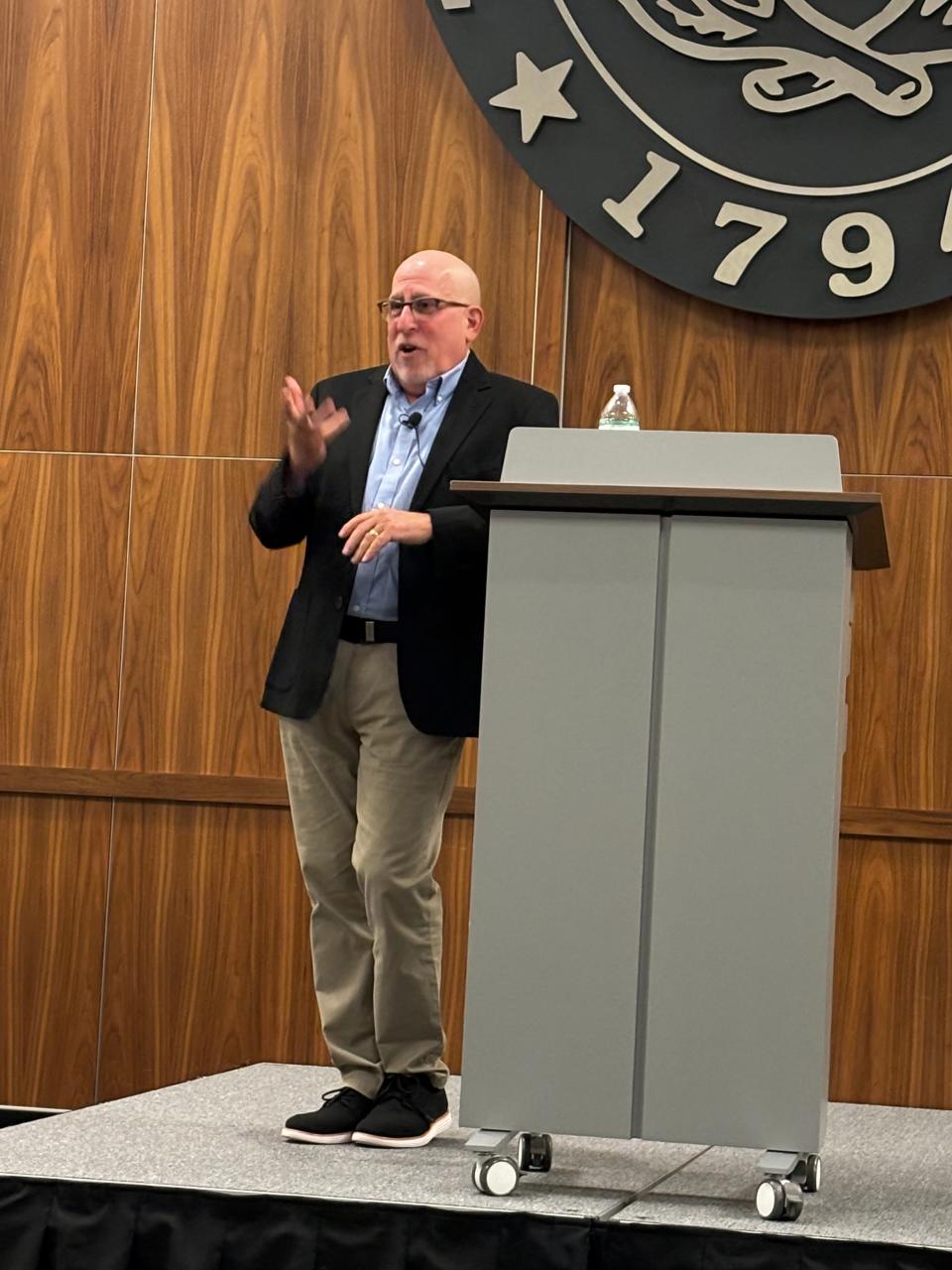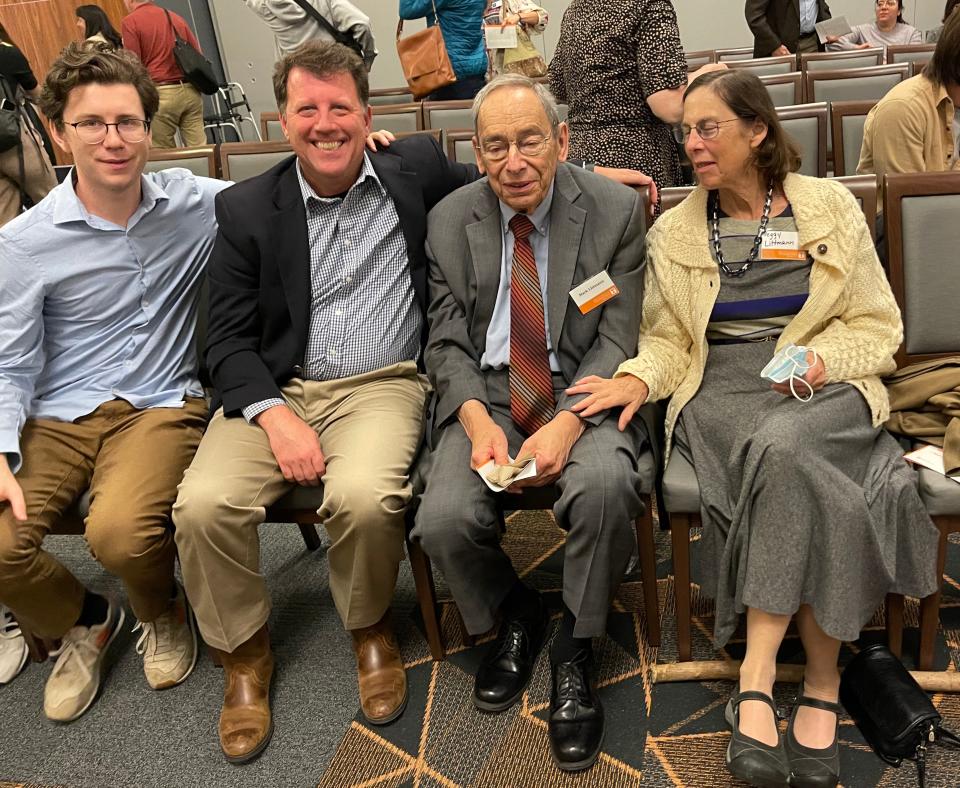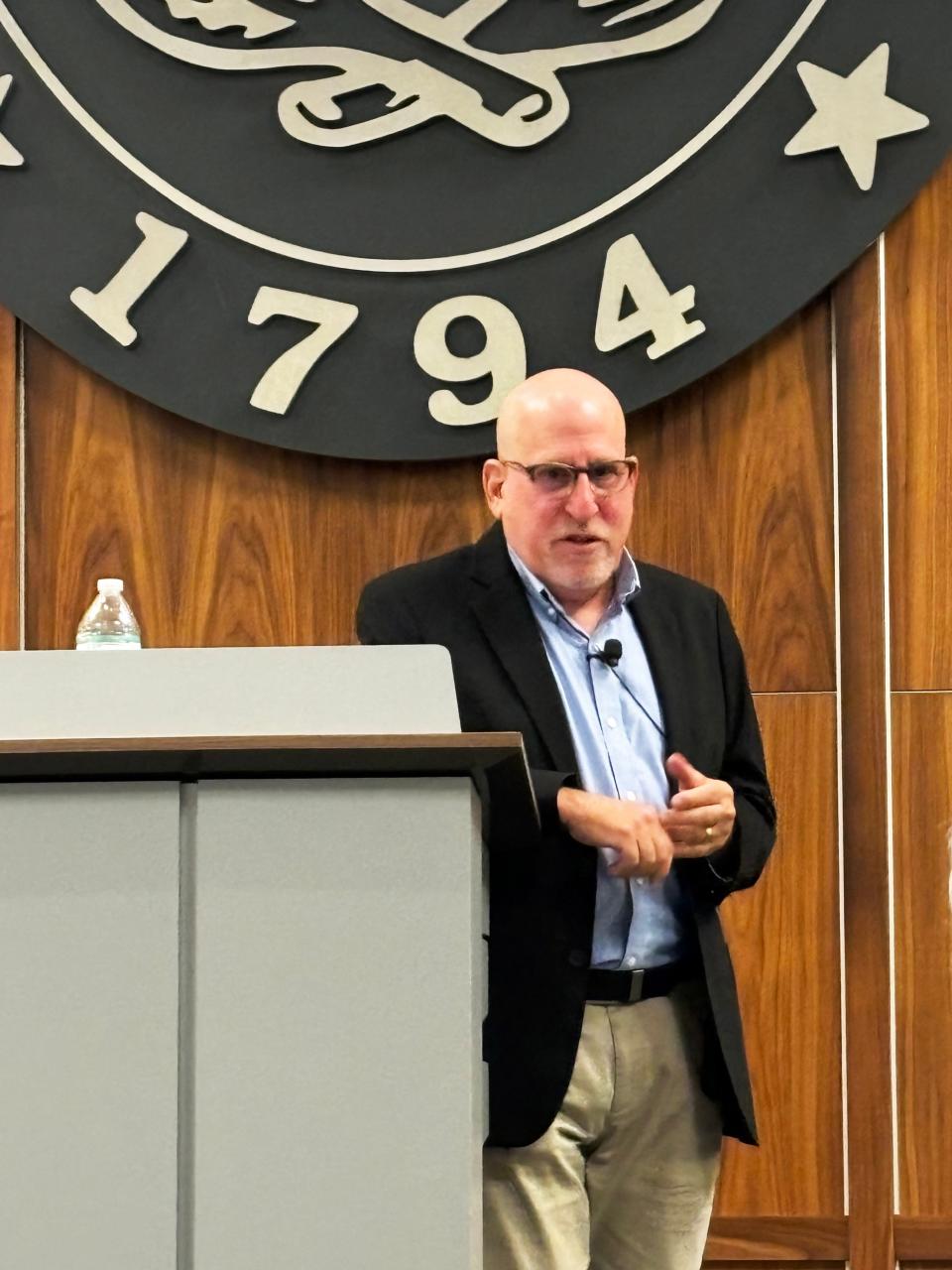NPR's Rob Stein speaks on the challenges of covering science in a post-pandemic world
“For three years I was cloistered in my attic broadcasting about the devastation of the novel COVID-19 virus that brought sickness, death and despair,” said Rob Stein, award-winning science journalist and senior editor on the science desk for National Public Radio (NPR). He began to realize that the “U.S. government health officials’ warnings were repeatedly ignored. I thought I was screaming into the wind, and nobody was listening to me.”
In his talk to an audience in the Student Union of the University of Tennessee at Knoxville, Stein was critical of the mixed messages issued by government officials. However, he expressed amazement that the federally funded Operation Warp Speed program produced in one year “medical miracles” – effective vaccines that saved millions of lives around the world during the pandemic emergency.

But, he added, “One-third of the Americans eligible for the original series of U.S. vaccines never got the shots. Only 17%, or one of every six people who were eligible, got the 2022 booster shot.
'1.1 million people have died ... and dying every day'
“Of those most likely to die from COVID, people ages 65 and older, less than half got that booster. Refusal to get vaccinated was the big reason why more than 1.1 million people have died in the United States and why so many Americans are still ending up in the hospital and dying every day because COVID is still with us.”
According to the World Health Organization, he noted, there have been more than 770 million confirmed cases of COVID worldwide and nearly 7 million deaths since the pandemic started in early 2020. He added that businesses and schools are still struggling with staff shortages as their employees become ill with COVID.
In his Hill Lecture about covering science and medicine for NPR, Stein said he had to talk about “the long dark shadow that the devastating pandemic has cast over the journalism field.”

He delivered the 30th lecture in the Alfred and Julia Hill Lecture Series on Science, Society and the Mass Media. It was established in 1989 by the late Tom Hill, former publisher of The Oak Ridger, and his sister Mary Frances Hill Holton in honor and memory of their parents, who founded The Oak Ridger in 1949. The lecture was hosted by the UTK School of Journalism and Media (which now includes UT’s NPR affiliate, radio station WUOT).
Before the pandemic Stein, who previously was a science reporter at the Washington Post, had covered genetics, cancer research, women’s health issues and other science, medical and health policy issues. He plans to focus more on cutting-edge biomedical technologies like gene editing, synthetic biology and stem cells.
“These technologies have enormous potential for curing diseases like diabetes, Alzheimer’s, cancer and heart disease,” he said. “They could revolutionize the way humans reproduce and help prevent miscarriages and birth defects and treat infertility. But these technologies are extremely controversial and raise a long list of tough ethical, moral and societal issues.”
Covering the 2020-22 pandemic for NPR, Stein noted, was “frightening, depressing and dispiriting. I went into journalism because I believed that a free press is fundamental to a free society and that accurate, reliable information could truly make people’s lives better and help keep people safe.”
During a crisis like a global pandemic, he said, he thought that journalists like him could “actually change people’s minds and convince them to do what’s right” to protect themselves and others against a new deadly disease.
He said he grew up believing in the power of medicine, public health and “the world-changing victories” in which vaccines “beat back some of the world’s worst scourges,” such as smallpox, polio and malaria. He argued that effective vaccines that have saved millions of lives, including the COVID-19 vaccines, have been “one of humanity’s greatest achievements.”
“I also grew up thinking that government health authorities’ pronouncements were listened to and could change people’s entrenched behaviors, such as smoking,” he said, noting that some government policies did change people’s behaviors for the better and save their lives.
He said he had written stories about the inevitability of another pandemic and had been aware that mask mandates, quarantines and vaccines had met opposition in past epidemics.
"I thought that when the long-feared pandemic finally arrived, the clear and present danger that threatened the world would overcome opposition to health measures and unite the country,” he said.
“The opposite happened; instead of uniting the country, the pandemic and the public health response to it had the opposite effect of dividing the country and intensifying the political polarization already in place. Masks and the new vaccines became political symbols. Social distancing and proposed treatments for the new disease became flashpoints for conflict.”
Why Americans distrusted pandemic experts
Stein offered several explanations for the unexpected American reactions against responses to the pandemic:
Our caustic political environment;
Already present bitter divisions;
Backlash against globalism and growing distrust of prominent American institutions and authority figures, including scientists, doctors and government health agencies and officials.
“It was also the first major pandemic of the internet, making it easier for scientists to communicate with each other and release their findings instantaneously by posting their papers on preprint servers,” Stein said, noting that they no longer had to wait weeks for their papers to be peer-reviewed and published in respected journals.
“Suddenly a flood of scientific data was unleashed on the public, but some of the information was just plain wrong,” he said. One reason, he added, was that this new coronavirus “suddenly mutated in unexpected ways and was continuing to evolve in ways that shocked scientists who had never seen this phenomenon before.”
As a result, Americans became confused (How far does the virus travel in the air? Must we wipe clean our counters and mail? Should we wear a surgical mask?) In the meantime, misinformation and disinformation about masks, quarantines and vaccines spread on the internet and social media. Because scientists lacked reliable information to counter misinformation, public hostility toward scientific and health authorities grew.
Stein said he had believed that the world-renowned U.S. Centers for Disease Control and Prevention (CDC) and other global health organizations, which had combatted infectious diseases like AIDS, Ebola and the first SARS virus, “would muster one of the most effective responses against the COVID-19 pandemic. I was naïve.”
He later said, “The CDC stumbled catastrophically in the beginning of the pandemic with the testing fiasco; it simply never recovered. To this day the CDC’s guidance remains painfully slow and it’s still often unclear and misleading.”
Stein said that the pandemic “exposed huge shortcomings in our disorganized, fragmented public health system” and “weakened” what was once a strong system that protected the public from infectious diseases. Even more disturbing, he added, “Overworked, underpaid public health workers have been vilified, harassed and injured by attacks from patients just for doing their jobs trying to protect the public and public health.”
Academic researchers and the news media sought information on the pandemic that the government failed to collect, so The New York Times and NPR teamed with elite universities to gather and publish useful data.
“I think the pandemic has changed science journalism probably forever,” Stein said, explaining that the rapid dissemination of new scientific advances over the internet is good for the public and science communication. “But it also means that science journalists like me must double down on our own efforts to quickly vet and validate new reports on preprint servers” to determine as best they can what is most likely accurate information.
Lessons for science journalists
“I think the pandemic has taught science journalists some valuable lessons,” he said. “We must be brutally honest about what we know and what we don’t know. We must tell the public that what we think scientists know today may very well change tomorrow. Science is a process; it does not know absolutely what’s true. It took decades of research to determine the certainty that cigarette smoking causes cancer.”
He explained that even though the public was told that the new messenger RNA vaccines against COVID are 95% effective based on 2020 trials, people were shocked by the breakthrough infections.
“The warning that the vaccine was not expected to prevent all COVID virus infections was lost in the messaging, permanently undermining the public’s confidence in the vaccines,” Stein said.
Another lesson of the pandemic for journalists, he said, is “to repeat, repeat, repeat. If you repeat the information enough, it becomes the truth. So that’s how science journalists can combat misinformation such as untrue statements that mRNA vaccines can reprogram your genes and have caused thousands of deaths.” He added that “science journalists must boil complex facts down to a very simple message or else people won’t listen” and must take readers and listeners’ “questions seriously and answer them to resolve their hesitancy and their distrust. We need to give answers in plain language that don’t sound dismissive.”
He lamented that many science journalists have lost their jobs because of the closures of local newspapers and that the life expectancy of Americans has continued to decline since 2000 because of gun violence, drug overdoses, suicides and health issues such as obesity, diabetes, heart disease and cancer.

This article originally appeared on Knoxville News Sentinel: NPR's Rob Stein speaks on covering science after COVID

